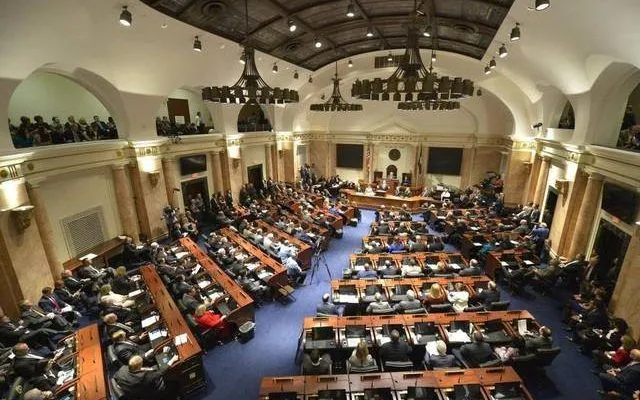The Kentucky legislature could call itself into session for an additional 12 days a year and extend regular sessions beyond the constitutionally-required end dates under a constitutional amendment filed Tuesday by House Speaker David Osborne.
Osborne (R-Prospect) told reporters Tuesday afternoon the amendment proposed by House Bill 4, if approved by voters, would give the legislature more time and flexibility in dealing with complex issues.
“We would be so much more responsive if we were able to just temporarily hit the pause button knowing that we’re coming back, especially on big issues like the budget,” Osborne said. “When there’s big issues pending, I just think it makes us more efficient.”
The state Constitution requires that legislative sessions end by April 15 in even-numbered years when the state budget is enacted and the legislature convenes for 60 days, and by March 30 in odd-numbered years when sessions are limited to 30 legislative days.
HB 4 would allow the legislature to extend regular sessions beyond those end dates if three-fifths of both chambers voted to do so. The legislature would still be limited to a total of 30 or 60 legislative days depending if it was an even or odd-numbered year.
It would also allow the Kentucky Senate president and the House speaker by joint proclamation to call the legislature into “additional sessions” that could last no more than 12 legislative days total each year.
Osborne said HB 4 is another attempt to pass a constitutional amendment giving the legislature power to call itself into session, something that voters rejected in 2022. The 2022 amendment would have allowed the legislature to call itself into special sessions for no longer than 12 days each. Only the Kentucky governor currently has the power to call the legislature into a special session.
The House speaker attributed the 2022 amendment’s downfall to it being “next to impossible to understand.” Osborne said this proposed amendment would be “simple and direct.”
The 2022 amendment was more than 700 words long, and more than 117,000 fewer votes were cast for or against that amendment than were cast in a U.S. Senate race between Rand Paul and Charles Booker.
About a dozen states including Kentucky allow only the governor to call the legislature into a special session, according to the National Conference of State Legislatures.
Kentucky Gov. Andy Beshear strongly opposed the 2022 amendment ahead of it being voted on, calling it a “power grab” that would disrupt the separation of powers in state government. A spokesperson for Beshear did not immediately respond to a request for comment about the bill.
Two other states, Arkansas and Idaho, in 2022 had constitutional amendments on the ballot to give their legislatures similar powers regarding special sessions; Arkansas voters rejected their amendment and Idaho voters approved their amendment.
--30--
Written by Liam Niemeyer. Cross-posted from the Kentucky Lantern.
Comments








